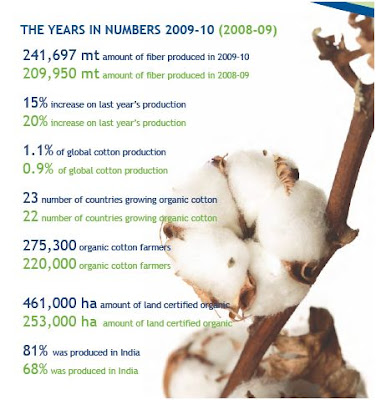The mission of CottonConnect is to transform the world’s cotton for good. We help reduce poverty and benefit the environment by supporting the creation and development of sustainable cotton value chains. We intend to build capacity amongst more than 100,000 farmers by 2015. This will positively affect the lives and livelihoods of more than 500,000 farmers and their families. We aim to increase the land under sustainable cotton cultivation practices by 1 million acres by 2015, thereby reducing water consumption and use of chemical fertilizers and pesticides.
How was the year 2010 for CottonConnect?
In 2010 we set up our operations. We also designed and delivered strategies and implemented programmes for our first customer C&A. There are a lot of learnings in the year past which should help us fine tune our activities in the coming years.
What do you see as the USP of CottonConnect?
Having the capacity to both strategize and implement programmes on the ground makes us a 'one-stop-shop' for brands to deliver their sustainability objectives.
What is unique about the CottonConnect proposition?
As a pioneering company with a 'business head' and a 'social heart', we are unique in the sense that we are able to engage with international brands and retailers and advise them on their cotton strategies. At the same time, we are able to implement these strategies through our teams based on the ground in South East Asia. Being 'standards neutral', we have the capacity to work across the brand’s supply chain, following the standards preferred by them, be it Organic, Fair Trade, Cotton Made in Africa (CMiA) or Better Cotton Initiative (BCI).
What are the actions that CottonConnect undertakes in order to make a supply chain more sustainable?
We offer the brands various products and services, some of which include mapping their cotton value chains to the source of fibre and developing a source of sustainable fibre through farmer training programmes. We also monitor the social and environmental impact by capturing data at the farm level on an annual basis. The sustainable fibre thus created is traced from the farm to the gin and onwards to the mills and garment factories. Our engagement with communities gives us the ability to identify areas of social development and we can help brands channel their social investments effectively.
What are the main challenges of working with Indian cotton supply chains and how are you tackling them?
Cotton is a complex market in India and supply chains are often not very transparent, with a plethora of intermediaries and middlemen. Most apparel factories have not looked at understanding their supply chains beyond the mill. As a result, there is very little understanding of the practices beyond the mills. By mapping a supply chain, we are able to bring transparency to the various links and a better understanding about what is happening in each part of the chain.
What do you think is the future of sustainable supply chains?
Over the next 10 years, there will be profound changes in markets globally as climate change continues, population grows and key resources fall short, impacting food, fibre and fuel markets.
The sensitivity of customers to these issues will create a demand for products which have environmental and social norms embedded in them. This new momemtum to develop more fair, committed and transparent cotton value chains is a huge opportunity for companies like ours.
Can you please tell us about your current projects?
We are currently working in most cotton producing states: Gujarat, Maharashtra, Orissa, Tamil Nadu, Rajasthan and Madhya Pradesh.
We have several projects for capacity building for cotton producers aimed at improving livelihood by increasing productivity as well as benefiting the environment through reduced use of chemicals and better water management.
In organic cotton production, CottonConnect has done substantial work on “integrity issues” by training organic cotton farmers and ginners with practices aimed at preventing contamination from genetically modified organisms. It is supporting organic cotton farm projects in seed production to help overcome the shortage of genuine organic seeds.
We are also working with partners like the Water Footprint Network (WFN) on a joint study which makes a comparison of surface and ground water pollution levels generated in organic as against conventional farming. We are also currently working on creating a fund which will allow farmers to get interest free loans for drip irrigation.














